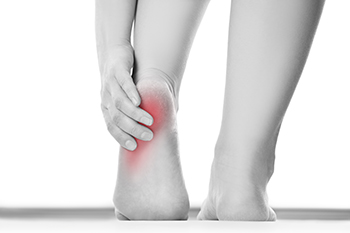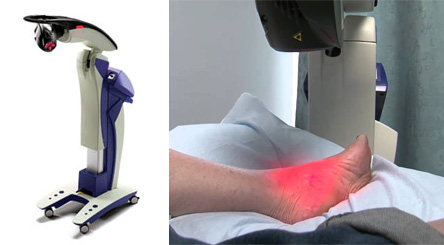Heel Pain
 Heel pain can be difficult to deal with, especially if you do not know what the underlying cause is. If you ignore your heel pain, the pain can magnify and potentially develop into a chronic condition. Depending on the location of your heel pain, you have developed a specific condition.
Heel pain can be difficult to deal with, especially if you do not know what the underlying cause is. If you ignore your heel pain, the pain can magnify and potentially develop into a chronic condition. Depending on the location of your heel pain, you have developed a specific condition.
One condition is plantar fasciitis. Plantar fasciitis is caused by the inflammation of the plantar fascia, or the band of tissue that connects the heel bone to the base of the toes. The pain from this condition is initially mild but can intensify as more steps are taken when you wake up in the morning. To treat this condition, medication will likely be necessary. Plantar fasciitis is often associated with heel spurs; both require rest and special stretching exercises.
There are various options your podiatrist may suggest for heel pain. Treatment options for heel pain typically include non-steroidal anti-inflammatory drugs (NSAIDS), which may reduce swelling and pain. Other options are physical therapy, athletic taping, and orthotics. In severe cases of heel pain, surgery may be required.
Preventing heel pain is possible. If you are looking to prevent heel pain from developing in the future, be sure to wear shoes that fit you properly and do not have worn down heels or soles. Be sure to warm up properly before participating in strenuous activities or sports that place a lot of a stress on the heels. If you are experiencing any form of heel pain, speak with your podiatrist to determine the underlying cause and receive the treatment you need.
MLS Laser Therapy
 MLS Laser Therapy stands for Multiwave Locked System Laser Therapy. This procedure is a minimally invasive procedure that targets pain points and reduces inflammation through the use of a laser light. The laser is used to penetrate the skin in an effort to reach those target areas that are causing the most discomfort. It then works towards healing wounds and repairing soft tissue.
MLS Laser Therapy stands for Multiwave Locked System Laser Therapy. This procedure is a minimally invasive procedure that targets pain points and reduces inflammation through the use of a laser light. The laser is used to penetrate the skin in an effort to reach those target areas that are causing the most discomfort. It then works towards healing wounds and repairing soft tissue.
This procedure is seen as a popular option among patients who would rather not go through surgery. MLS Laser Therapy has been found to be particularly useful in healing conditions such as neuroma, plantar fasciitis, diabetic ulcers, arthritis, and tendonitis. Those suffering from heel pain or dealing with a sports injury may find this type of treatment useful as well.
For more information about the treatment process of MLS Laser Therapy and to see if it’s the right option for your condition, we recommend you speak with our podiatrist for professional advice and care.




